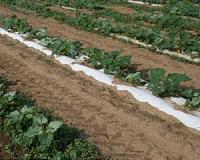 |
Gettysburg PA (SPX) Jan 04, 2011 Peach producers have traditionally relied heavily on hand thinning, a necessary but costly and labor-intensive field practice. Impacted by increasing labor costs and a limited workforce, peach and other stone fruit growers are turning to mechanical methods such as string thinners to minimize the need for hand thinning. A new ''hybrid'' string thinner prototype showed promising results when it was evaluated in four U.S. growing regions; the trials resulted in significant labor savings and increased peach size. According to Pennsylvania State University's T. Auxt Baugher, corresponding author for the research report published in HortTechnology, the goal of the study was to determine if a new string thinner prototype designed to thin vase or angled tree canopies could be adapted for varying orchard systems. Trials with the hybrid mechanical blossom string thinner were performed in California, South Carolina, Washington, and Pennsylvania commercial orchards. The prototype used in the experiments was a hybrid of a vertical rotating string thinner designed to remove apple blossoms in organic orchards and a horizontal prototype evaluated in previous peach thinning trials. The researchers evaluated blossom removal rate, fruit set, labor required for follow-up hand thinning, fruit size distribution at harvest, yield, and economic impact. Additional information was collected using case study interviews of growers and orchard managers. String thinner trials demonstrated reduced labor costs compared with hand-thinned controls, and increased crop value due to a larger distribution of fruit in marketable and higher market value sizes. Blossom removal ranged from 17-56%, hand thinning requirement was reduced by 19-100%, and fruit yield and size distribution improved in at least one string-thinning treatment per experiment. Notably, the savings in hand-thinning requirement and increases in fruit size distribution increased the economic value of the peach crops beyond that of hand thinning alone, with gross income ranging from $4,267-9,127 per acre in processing plantings and $5,097-12,288 per acre in fresh fruit plantings. Net positive economic impact from mechanical thinning (realized economic savings beyond hand thinning alone) ranged from $236-1,490 per acre and $264-934 per acre for processing and fresh fruit plantings respectively, with the exception of one treatment in which the economic impact was negative. According to Baugher, "increased fruit size had a greater positive impact for fresh market producers, while labor savings and yield increases (due to larger fruit size) were of greater importance for canning peach growers." In another aspect of the report-case study interviews with 11 Pennsylvania growers and orchard managers who had used the prototype-interviewees suggested that commercial adoption of mechanical string thinning technology would have positive impacts on the work place. All case study participants reported that the technique made crop load management more efficient and reduced follow-up hand-thinning time, while 80% of the growers noted that fruit from thinned trees were larger. were satisfied with mechanical thinning, as it saved them time and minimized ladder use, and that the seasonal distribution of labor-intensive work was improved. The string thinner prototype developed for the study has been commercialized and will be manufactured in both North America and Germany.
Share This Article With Planet Earth
Related Links American Society for Horticultural Science Farming Today - Suppliers and Technology
 Paper Mulches Evaluated For Commercial Vegetable Production
Paper Mulches Evaluated For Commercial Vegetable ProductionLexington KY (SPX) Jan 04, 2011 Polyethylene mulches, used widely in commercial vegetable production to improve crop yields and produce quality, have distinct disadvantages. Disposal options are limited, and plastic mulches often end up in landfills, being burned, or disposed of illegally. Recycling polyethylene mulches is also a challenge; the mulches used in large-scale vegetable production are contaminated with too mu ... read more |
|
| The content herein, unless otherwise known to be public domain, are Copyright 1995-2010 - SpaceDaily. AFP and UPI Wire Stories are copyright Agence France-Presse and United Press International. ESA Portal Reports are copyright European Space Agency. All NASA sourced material is public domain. Additional copyrights may apply in whole or part to other bona fide parties. Advertising does not imply endorsement,agreement or approval of any opinions, statements or information provided by SpaceDaily on any Web page published or hosted by SpaceDaily. Privacy Statement |